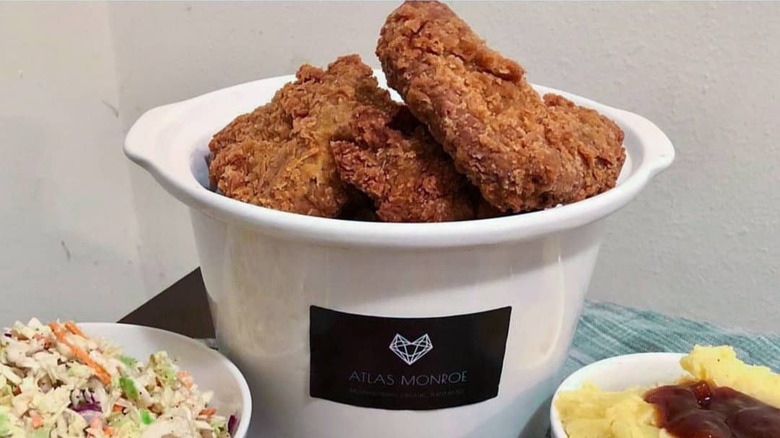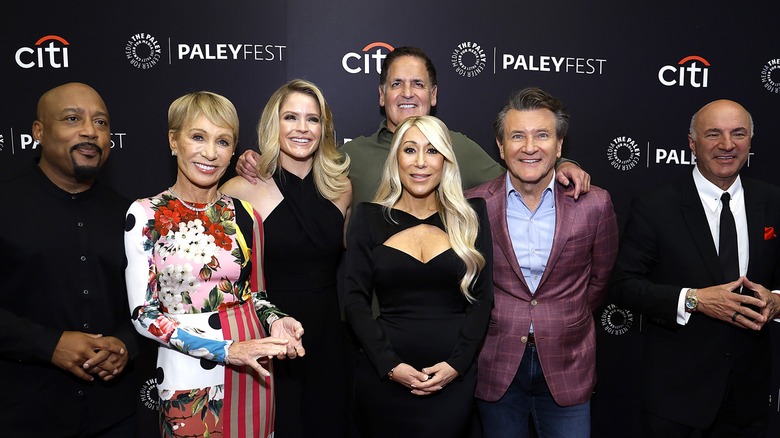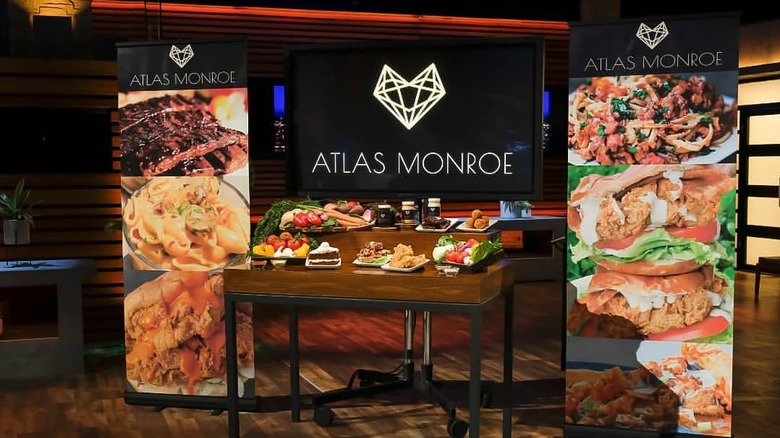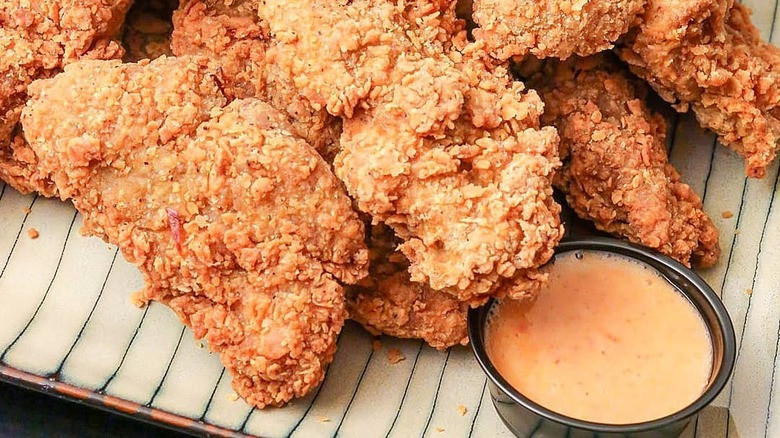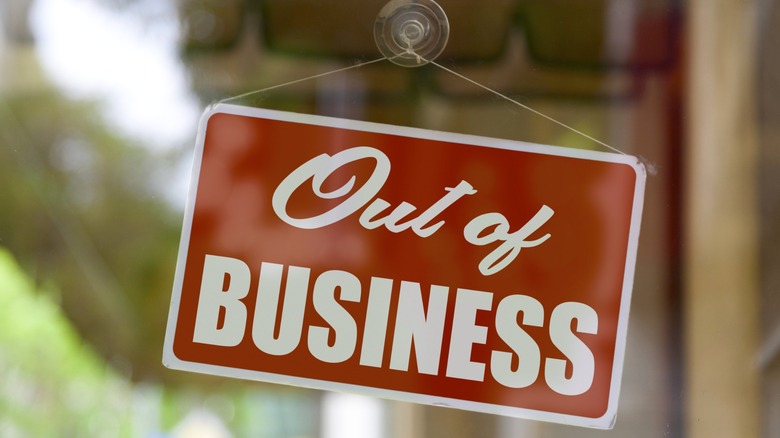Atlas Monroe: Here's What Happened After Appearing On Shark Tank
After her father was diagnosed with type 2 diabetes, Deborah Torres decided it was time to make healthy eating a priority. She and her family went on a 90-day diet of consuming only organic vegan foods, which often left them wanting something more substantial in their bellies. Still, it paid off. When her father went back to the doctor after that 90-day stint, she reported that they found that he no longer had the typically long-term condition.
During her initial stint going vegan, Torres found herself experimenting in the kitchen, attempting to create dishes that conformed to her dietary constraints while also meeting the needs of her taste buds. After much trial and error, she came up with a recipe for a plant-based fried "chicken" that didn't contain any poultry. The vegan meal was so enticing she determined others should have a chance to try it — and buy it. She began selling her proprietary faux chicken at festivals, with folks sometimes waiting two hours in line to get a taste of the dish.
Torres was eventually primed to expand the business — dubbed Atlas Monroe — even further, but she needed capital to make that dream come true. She chose to reach out to some of the most notorious venture capitalists in the game, the sharks from ABC's "Shark Tank."
What happened to Atlas Monroe on Shark Tank?
Torres walked on set with her husband, Jonathan Torres, and wasted no time stating she was seeking $500,000 for a 10% stake in Atlas Monroe. Before going too far into the details of the product and its sales, she let the sharks try her creation without telling them exactly what it was. The venture capitalists crunched away on the dish with enthusiastic facial expressions, leading Torres to let the cat out of the bag and reveal they were actually eating a wheat-based product.
The sharks were impressed with the cuisine, but things quickly took a turn when they inquired about the numbers behind the business. Torres threw out some odd figures, leading Mark Cuban to say, "That doesn't add up" (via Hulu). After hearing Torres list off more confusing numbers, Kevin O'Leary had heard enough and eliminated himself from the investment opportunity. Corcoran followed suit, saying the business was "Too confusing, and it's a ridiculous number you're asking."
Despite these lackluster, Cuban offered $500,000 as a line of credit for 30% of the company. While Lori Greiner was explaining why she would not invest, guest shark Rohan Oza and Cuban held a side discussion in hushed tones. They soon offered $1 million for the entire business on top of a 10% royalty on the product in perpetuity. Torres was reluctant and indicated she liked Cuban's initial offer ... but that was no longer on the table. After some contentious back and forth, Cuban rescinded the offer. Like with Peekaboo Ice Cream's appearance on the show, Atlas Monroe walked away without taking a deal.
Atlas Monroe After Shark Tank
Torres told VegNews that she felt misrepresented after the show aired, saying, "There were many edits of conversations to make it appear that I wasn't intelligent enough for obvious dramatic effects of the 'shocking' ending." She expressed similar disdain on the "Business for Good" podcast, where she stated, "They said, or some of some of them have said, Hey, your valuation's all wrong. You're not even worth the 500,000. You guys know exactly how much this is worth, and if you're gonna double what you said I wasn't worth, I know that what I have is pure gold."
With a product that was the first vegan fried chicken to be featured at the National Fried Chicken Festival (and which received the honor of being dubbed better than all the bona-fide chicken recipes there by Extra Crispy editor Ryan Grim) Torres was motivated to prove she could make more money selling it herself rather than relinquish control of the company.
By 2021, Atlas Monroe had a 10,000-square-foot factory in San Diego, California that produced the proprietary faux-meat recipe, selling over $2 million of the imitation chicken online. It also started producing other vegan foods like smoked ribs, vegan bacon, and sweets like chocolate cake. However, while $2 million in sales is nothing to sneeze at, it is unknown how much of that translated to a profit. Setting up a sizable factory isn't cheap, and the company may have taken on more debt than it could handle.
Is Atlas Monroe still in business?
Atlas Monroe managed to get its faux chicken into customers' hands via multiple vegan restaurants including one of the biggest vegan chains in the world, Copper Branch. The company also opened up its own signature restaurant located in San Diego. However, despite plans to get her imitation chicken into more mainstream restaurants and grocery stores, Atlas Monroe has joined other "Shark Tank" failures like KidsLuv beverages.
While the company's website is still functional and lists locations that once sold the product, you can't place an order for its products. Its once-active social media profiles became dormant by late 2023, and Yelp indicates that the standalone restaurant has closed. In 2024, Atlas Monroe, operating under the corporate banner JD Torres LLC, filed for Chapter 7 bankruptcy. Its assets were auctioned off to the highest bidders, and the company was suddenly absent from the vegan food scene.
What's next for Atlas Monroe's founders?
Torres achieved outstanding success creating a formidable vegan food empire, only to have it disappear seemingly overnight, indicating the sharks may have been correct that there were aspects of running a business she didn't fully comprehend. As one fan of Atlas Monroe's products opined on Yelp, "This is a cautionary tale that confirms that just because someone has a good product doesn't mean they will be successful in business as it appears that it all got away from the owner and she just couldn't keep up."
After the Torres duo left the "Shark Tank" stage, O'Leary continued to rant about how she was missing the big picture, maintaining that the offer from Cuban and Oza confused her just as much as her own numbers. He argued that the couple could have walked out of the tank $1 million richer with the potential to make passive income for the rest of their lives.
Cuban contended that plenty of people don't know everything about business, but it is crucial if you want to play in the big leagues to admit what you don't understand. Torres thought her product was far more valuable than what she was offered on the show, but failing to admit that she may not have understood every aspect of the business perhaps contributed to the downfall of Atlas Monroe.
